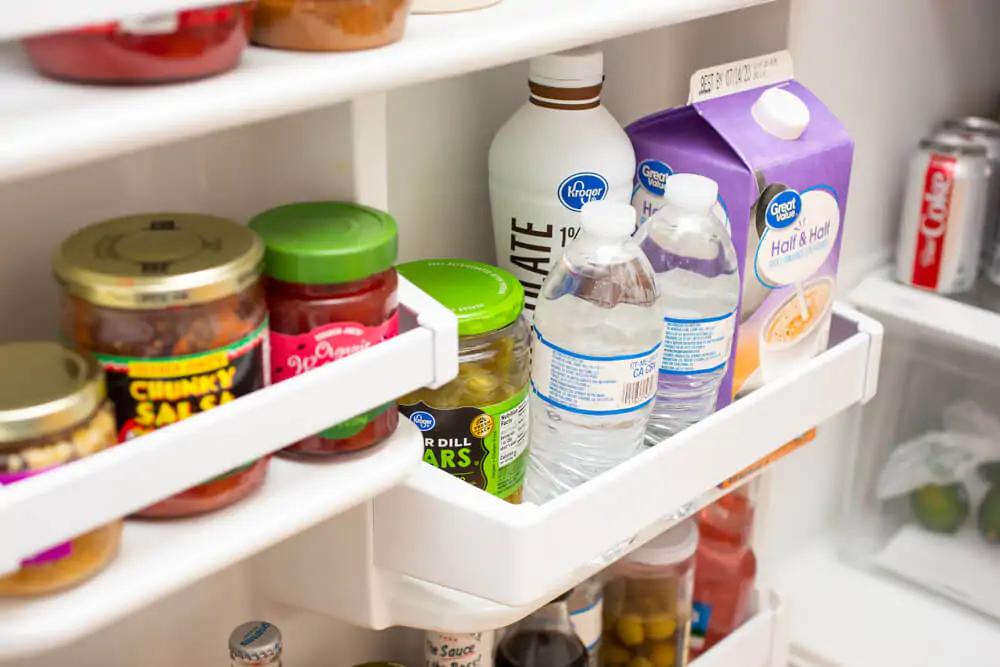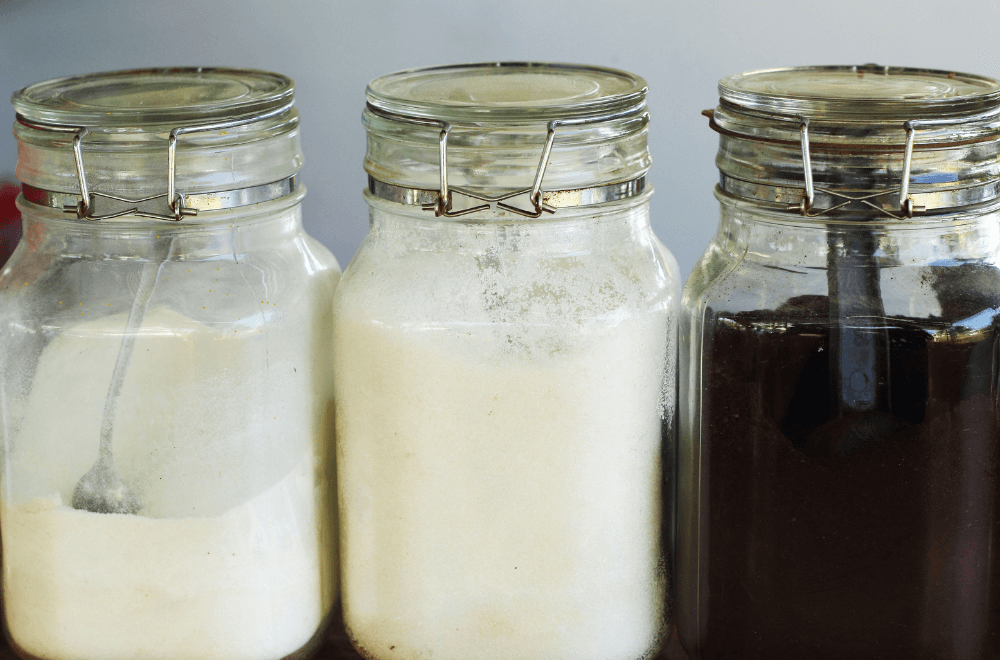You may have bought new creamer and asked yourself, “do coffee creamers need to be refrigerated?” Dairy-based creamers must be refrigerated. Let’s learn more.

Have you ever made your morning coffee, rushed out of the house, only to return and find your creamer still sitting on the counter? A good cup of coffee with a bit of delicious creamer is a real morning treat. So, when you accidentally leave your coffee creamer out for more than a few hours, it can leave you wondering if it is still safe to drink.
Whether a container of coffee creamer can be left out of the fridge or unrefrigerated depends on what it is made from. Dairy-based creamers almost always need to be refrigerated to keep from spoiling. Non-dairy creamers can generally be stored at room temperature without a problem.
There’s much more to learn about storing coffee creamer, so let’s dive in. You might also be interested in learning do coffee creamers need to be refrigerated.
Do Coffee Creamers Need To Be Refrigerated?
Depending on the type of creamer that you are using, the answer to this question can be either yes, or no.
For almost all liquid coffee creamers, leaving it out of the refrigerator for a short amount of time is not a problem. When we say short, we mean up to two hours at the most, especially for dairy-based creamers. For creamers that require refrigeration to remain stable, this is the maximum amount of time you should leave your creamer out.
Dairy-Based Creamers Must Always Be Refrigerated
In general, a good rule of thumb for coffee creamers is that dairy-based creamers need to be refrigerated. They should be stored in the fridge before opening and remain in the fridge after.
Although you can leave them out for a short period, the less time they spend at room temperature, the better in order to maintain freshness and taste. Bacteria can grow pretty quickly when dairy products are unrefrigerated and make you sick.
Refrigerated creamers also tend to be a bit thicker and add a more creamy texture to your coffee. Additionally, if you need your creamer to cool down your coffee so you can drink it faster, cold creamer works better.

When it comes to dairy-based creamers, you should treat them just as you would with a carton of milk or half-and-half. Dairy products like this are generally safe to leave out for short periods, but much longer than that, and you risk spoilage. Your coffee creamer may not spoil right away, but you will notice that it will go bad much sooner if you leave it on the counter for too long, especially on a hot day.
If you are unsure whether your creamer can be left unrefrigerated, the best thing you can do is read the label. Most coffee creamers that need to be refrigerated indicate so on the container. If you don’t see the “refrigerate after opening” label, you have two choices, you can store your creamer in your pantry, or to be safe, tuck it in the fridge for a longer shelf life.
Non-Dairy Creamers Don’t Always Need Refrigeration
If you find that you frequently forget to return your coffee creamer to the refrigerator, pick one that doesn’t need to be chilled to be tasty and fresh. Non-dairy creamers should be stored in the fridge, but it is not always a necessity like it is with dairy.
Here’s the thing, even non-dairy creamers that do not need refrigeration to remain stable will last longer if they are stored in the refrigerator. Colder temperatures will slow the growth of bacteria that can spoil even non-dairy creamers.
It is a good idea to treat non-dairy creamers that require refrigeration the same as dairy-based creamers to be on the safe side and maintain the flavor. Put them away as soon as you can.
The Rules For Storing Your Coffee Creamer
If we have only made the question about where to store your favorite coffee creamer more complicated, then allow us to break down the rules.
- Dairy-Based Creamers: These are the creamers that use milk or cream, or both as the primary ingredients. These creamers should always be stored in the refrigerator.
They are usually fine if you leave them out for up to two hours. Leaving them out overnight or for a full workday will contribute to spoilage; in that case, throw them out.
- Non-Dairy Creamers: Believe it or not, non-dairy creamers are lactose-free, not fully dairy-free. They usually contain some caseinate, which is derived from milk, but the main ingredients are usually plant-based. Whether they should be refrigerated depends on if they are a liquid or powder.
Liquid non-dairy creamers should be refrigerated. This will extend their shelf life. Powdered non-dairy creamers can be stored on the counter or in your pantry, in some cases, for up to three years.
- Dairy-Free Creamers: Most of these options are liquid creamers made from plant-based milk, like oat, soy, or almond. These creamers tend to be alright if left unrefrigerated; however, refrigeration almost always increases the shelf life of dairy-free creamers.
The exception to this rule is if you are using a coffee creamer that is made from sheep’s or goat’s milk. These are also considered dairy-free but still contain animal-based milk. However, these are much like dairy-based creamers and do need to remain refrigerated to keep from spoiling.
Best Practices For Non-Dairy Coffee Creamers
Non-dairy coffee creamers are often the best option for individuals that are sensitive to cow’s milk or have tree nut allergies. While these products often contain some milk-derived products, they tend to be a more practical option for many people.
If you have selected a non-dairy option, there are some steps that you can take that will prolong the life of your favorite creamer.
- You’ll find most of your non-dairy creamers on the shelf with other dry goods in your local grocery store. If you are selecting a liquid non-dairy creamer, it is good practice to refrigerate it after it has been opened.
- Powdered non-dairy creamers are also found with dry goods in the grocery store. They should not be refrigerated because the introduction of condensation or humidity from your refrigerator can cause clumping. This will reduce the shelf life of powdered creamers.
- If you are buying a liquid non-dairy creamer and you still aren’t sure what to do with it after it’s opened, the best idea is to read the label. The manufacturer will tell you if it should be stored in the refrigerator or not. However, we still think the best solution is to always keep your liquid coffee creamer in the refrigerator.
Storing Powdered Coffee Creamer

You might find powder-based creamers easier to manage. These can be made from dairy or plant-based ingredients. Most of these just need to be stored in a cool, dry place and away from direct sunlight; ensure you close the lid properly after every use.
These products, both dairy and non-dairy, are made to be stable for a very long time without refrigeration. Powdered coffee creamers are a great option if you are traveling or camping and don’t want to worry about spoiling your coffee creamer. Learn more in our explainer on why is my coffee creamer chunky.
Powdered creamers usually have a shelf life of between one and three years. It is important to remember that the one thing that can spoil your powdered coffee creamer is moisture.
You do not want to introduce water or other liquids to your powdered coffee creamer until you are ready to use it, so always use a clean, dry spoon when serving.
Moisture will cause clumping and can also attract bacteria and mold. If you liked this post, you might be interested in our guide on how to make coffee creamer.
